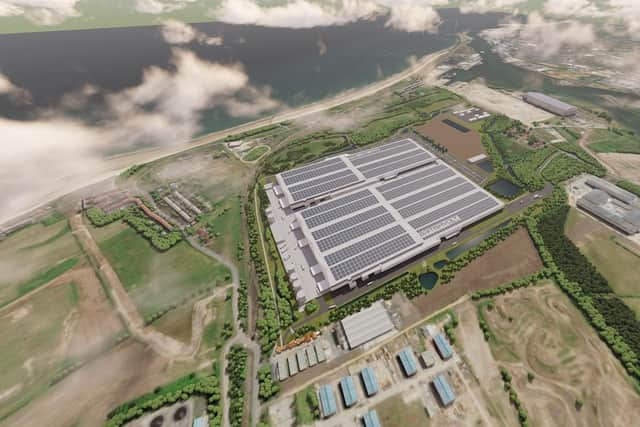Britishvolt's £3.8bn Northumberland gigafactory pushes back production until mid-2025.
and live on Freeview channel 276
Formed just three years ago, the company had originally hoped to start production by late 2023, but quickly realised this target was over-optimistic and therefore adjusted it to the end of 2024.
However, co-founder and former chief executive Orral Nadjari, who remains Britishvolt’s largest shareholder, has explained a combination of factors means production will need to be delayed until the middle of 2025.
Advertisement
Hide AdAdvertisement
Hide Ad"Rampant” inflation, rising interest rates and the increased cost of energy have been cited by Mr Nadjari as some of the factors. The company also wants to focus on its ‘mini’ gigaplant, a research and development centre at Hams Hall in the Midlands.


He told the Financial Times: “The main facility will be delayed slightly into mid-2025. It does go hand-in-hand with the fact that we have inflation, we have recession and we have geopolitical uncertainties.”Britishvolt spokesman Ben Kilbey said: "The rescheduling has pushed the gigaplant start date to mid-2025. So, in reality the new ‘delay’ is six-months, and the total adjustment is 18 months.
“However, our cells are heading to customers as we speak for testing, so we remain on track to getting our product to customers.”
Mr Kilbey said focus was turning towards Britishvolt’s research and development centre, Hams Hall, which is based in the West Midlands.
Advertisement
Hide AdAdvertisement
Hide AdHe explained: “This [Hams Hall] will act as a mini replica of the Blyth site, giving us the opportunity to embed best practice, fine-tune chemistries, optimise machine layout, and ensure that the gigaplant is one of the most efficient, highest quality and lowest carbon emitting globally.”


He insisted the company was ahead of schedule when it came to enabling works at the gigaplant site in Cambois, which has enabled it to focus on design work and reschedule some construction work.
He added: “Flexing the plan in this way enables us to better source materials, given current supply constraints due to the global economic situation, and to enhance our cost efficiencies.
“Plans remain on track and are agile and nimble to counter external market forces.
Advertisement
Hide AdAdvertisement
Hide Ad"Considering current inflationary pressures, and an increase in interest rates, we are seeing a trend in the market of revised valuations in order to continue to attract investors.
"Our key priority is the success of the business and playing a vital role in the energy transition.”
Worth £3.8 billion, the plant is one of the UK’s biggest-ever industrial investments, and the largest in the North East since Nissan arrived in 1984.
It will create around 8,000 jobs, and Prime Minister Boris Johnson has previously described Britishvolt as part of the “UK’s place at the helm of the global green industrial revolution”.
Advertisement
Hide AdAdvertisement
Hide AdAnalysts have warned that a failure to build battery production capacity in the UK raises the risk the car industry ultimately shifts to mainland Europe, where Asian manufacturers are setting up production.
The electric battery industry is dominated by Asian producers such as CATL, LG Chem and Panasonic.